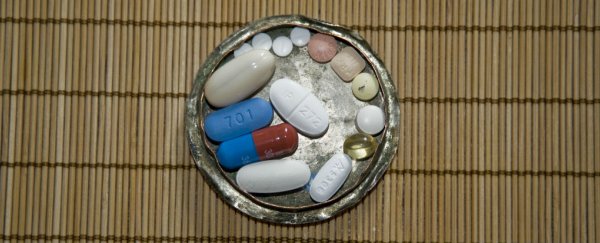A new study following 657 people who took the HIV prevention drug Truvada for 2.5 years has found that 100 percent of them remain HIV-free - even those in high-risk environments. The pill, which has to be taken every day without fail, has been on the market in the US since 2012, and trials are currently underway all over the world, across Africa, Asia, South America, and in several Australian states.
But despite promising results, researchers are hesitant to overstate the potential of the drug in combatting the spread of HIV because of how fast its efficacy falls when a pill is skipped, and the persistent stigma that's followed its use in the US.
The pill is known as a pre-exposure prophylaxis, or PrEP, and according to lead author and epidemiologist Jonathan Volk from Kaiser Permanente San Francisco Medical Centre in the US, this study is "the first to extend the understanding of the use of PrEP in a real-world setting and suggests that the treatment may prevent new HIV infections even in a high-risk setting".
Previous studies have resulted in similar - but less 'perfect' results - with a clinical trial working with 2,499 gay male participants from six countries (Brazil, Ecuador, Peru, South Africa, Thailand and United States) in 2012 finding that it was 99 percent effective in preventing infection. The study led to US Food and Drug Administration (FDA) approving the pill for use by anyone who wants it, rather than just people who were already HIV positive as a result.
The US Centres for Disease Control and Prevention (CDC) says that the pill has been shown to reduce the risk of HIV infection by up to 92 percent - but only when taken consistently every day. And therein lies the problem.
"What proportion of the population vulnerable to HIV will take a pill a day to prevent it? How will costs of the medication and clinic visits be paid for?" University of California-San Francisco researchers Kimberly A. Koester and Robert M. Grant asked in a commentary published with the study in Clinical Infectious Diseases. "Assuming people are willing to use PrEP and can access PrEP, will they take the medication as directed? Will uptake and use be higher or lower among those at higher risk? Will people place themselves at higher risk or HIV and sexually transmitted infections (STIs) as a consequence of using PrEP?"
The problem with the most recent study is that its results are contingent on people taking the pill religiously every day for the rest of their life, which isn't exactly practical, and the CDC says it's "much less effective" if not taken consistently. Even studies where high-risk people were paid to take the pill consistently failed, as The New York Times reported earlier this year:
"Paying patients in the Bronx and in Washington - where infection rates are high among poor blacks and Hispanics - up to $280 a year to take their pills daily improved overall adherence rates very little, the study's authors said. …
The failure of the cash-incentives trial - known as HPTN 065 for H.I.V. Prevention Trials Network - was a surprise and a disappointment to scientists and advocates. It had paid out $2.8 million to 9,000 patients in 39 clinics over three years, but the clinics where money was distributed did only 5 percent better than those that did not - a statistically insignificant difference."
Not only does the drug pose a risk to those who don't take it consistently, it's been criticised in the US because of the temptation to forgo condoms, which brings with it an increased risk of catching other sexually transmitted diseases. The hashtag #Truvadawhore went viral soon after its FDA approval, despite the fact that studies have found that taking the pill doesn't actually result in a reduction in safe sex practices.
"The problem lies in a generational dispute between older gay men, who lived through the worst of the AIDS crisis, and younger ones, who often see HIV as little more than a chronic but manageable disease," Mark Joseph Stern writes for Slate.
Right now, researchers recommend taking the pill every day alongside a separate regime for keeping other STIs at bay. There are also studies underway now to see how effective the pill could be when taken before and after sex rather than daily, The Washington Post reports.
